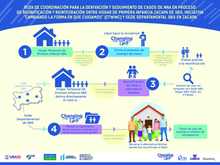Displaying 881 - 890 of 4424
This panel discussed coronavirus-associated caregiver loss and the work being done by the international community, the U.S. government, and faith-based actors to support vulnerable children and turn the tide toward better care. It was moderated by Gillian Huebner, executive director of the Georgetown University Collaborative on Global Children’s Issues.
Developed by Family for Every Child's Disability Working Group, the toolkit aims to strengthen the capacity of CSOs, social workers, service providers, government institutions and Members of the Family Alliance to include children with disabilities and their families in their advocacy, service delivery or other work. During the workshop, Disability Working Group members will share more on the purpose and vision of the toolkit, and demonstrate how to use it.
This panel will discuss coronavirus-associated caregiver loss and the work being done by the international community, the U.S. government, and faith-based actors to support vulnerable children and turn the tide toward better care. It will be moderated by Gillian Huebner, executive director of the Georgetown University Collaborative on Global Children’s Issues.
Esta ruta fue aprobada por la Secretaría de Bienestar Social para ser utilizada en Zacapa por los trabajadores sociales y psicólogas que están involucrados en el proceso de manejo de caso para la reintegración de los niños y niñas del cuidado residencial hacia el cuidado familiar. Esta diseñada para apoyar la celeridad de los procesos y atención a casos.
The webinar will share findings detailed in a policy brief that features an increased focus on the well-being and working conditions of caregivers in the informal economy. The brief highlights the need to consider sustainable policy and protection responses instead of quick, short-term measures for more disability inclusive, gender-transformative, and equitable solutions.
This webinar, the sixth in the Transforming Children's Care Webinar Series, provided an introduction to trauma-informed care from various perspectives and vantage points.
This webinar will provide an introduction to trauma-informed care from various perspectives and vantage points. The webinar aims to provide basic understanding of trauma informed care, and different approaches and tools that have been used in a range of contexts and with various populations of children and those around them.
Hosted by the Early Childhood Development Action Network and the Global Partnership to End Violence Against Children, this webinar offers an opportunity to learn more about the prevalence and impacts of corporal punishment in early life, to hear about global progress towards prohibiting and eliminating corporal punishment in the early years, including examples of good practice, and to discuss strategies for ending corporal punishment as a priority for promoting the rights and wellbeing of young children and supporting the development of peaceful and strong societies.
This webinar aims to provide concrete steps for policymakers, national statistical officers and practitioners to invest in data collection and leverage migration data for policy, and to offer practical guidance on gender-responsive migration governance.
Philip Goldman and Christina Tobias-Nahi in live panel discussion at the #FaithAndChildSafeguarding summit.

